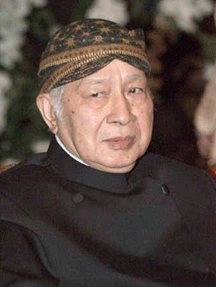
By Timothy Daniels
Former President Suharto, long-time dictator of Indonesia, has passed away on January 27, 2008. He came to power during a shadowy “coup†in 1965 which resulted in the charismatic first president, Bung Sukarno, being unseated and imprisoned and in the massacre of thousands of people in what came to be known as the “year of living dangerously.†Bung Sukarno was a leader of the non-aligned movement during the Cold War era and architect of an unifying ideology (nasakom) which sought to include nationalists, religious organizations, and communists—the three main streams of the anti-colonial movement—within national governing units. US political officials viewed Bung Sukarno as a threat to the “free†and “democratic†First World and Suharto, an opportunistic lower-ranked colonel, as the military strongman to keep Indonesia under western influence.
President Suharto erected a “New Order†regime ruling the Republic of Indonesia for thirty-two from years 1965 to 1997. His regime ruled with an iron-fist smashing any form of political and cultural resistance. The largest communist party in the world was destroyed and thousands of its members and sympathizers killed. Many political opponents were arrested and charged with being “OTB†or seditious organizations without form. Demonstrators were arrested, tortured, and sometimes shot or made to disappear. Religious organizations were forced to adopt the secular nationalist ideology as the basis of their groups. Cultural troupes and performers were disbanded unless they toted the hegemonic messages of the regime. Chinese Indonesians, many of whom were killed as communist “sympathizers,†were used as frequent scapegoats for economic problems playing on their socioeconomic divide with Indonesians of “indigenous†categories. Suharto’s “New Order†regime, the recipient of millions of dollars of foreign aid, developed a widespread system of patronage and corruption. Many of my Indonesian interlocutors in the mid-1990s told me that Suharto and his cronies were like “landlords†and the rest of the Indonesian population, the fourth largest in the world, were merely “renters.†US officials were supportive of his regime until its twilight hours.
Suharto was finally forced out of power in 1997 amidst multi-dimensional crises and massive street demonstrations demanding “Reformation.†Demonstrators’ demands for change have given the current era its name; yet reformation has only begun as the country has struggled over what to do with Suharto’s legacy. Anti-corruption commissions have tried unsuccessfully several times to bring Suharto to justice for his corruption and violation of human rights. Theatrical performances have ridiculed the corruption of anti-corruption boards as they had sufficient evidence to decide cases but threw away the evidence. Was there no will in the world to punish a faithful servant of western imperialism who was responsible for killing thousands?
After scores of Indonesia’s best doctors failed to overcome Suharto’s multi-organ failure, the current president, Susilo Bambang Yudhoyono, also from a military background, called for a week of mourning for Indonesia’s former president. Government officials planned an elaborate funeral as Suharto’s corpse was transported to Solo, Central Java. Din Syamsuddin, the national head of Muhammadiyah, publicly called for Muslims to pray for Suharto and to forgive him for his many mistakes. Even the United Nations Anti-Corruption Convention lowered its flag to half-mast to honor the former dictator. Ambassadors of various nations streamed in to pay their respects. Have we forgotten about the thousands of victims of Suharto’s “New Order†regime? Have we forgotten about the millions of dollars he and his cronies stole while millions of Indonesians lived off garbage dumps?
The fact is even if Indonesians find it in their large hearts to pray for and forgive the mistakes of this dictator they still have to deal with his legacy. A legacy of corruption, state repression, military privilege, exploiting ethnic and religious divisions, blaming Chinese, elite and foreign control of resources and of an unreliable legal system still haunts the nation. Who knows whether he should have faced the same punishment as Saddam Hussein? But if there is no justice in this world, let us at least pray for it in the Hereafter.
[Professor Timothy Daniels teaches anthropology at Hofstra University. He has conducted ethnographic fieldwork in Indonesia and Malaysia.]
This post has been picked up by the History News Network.